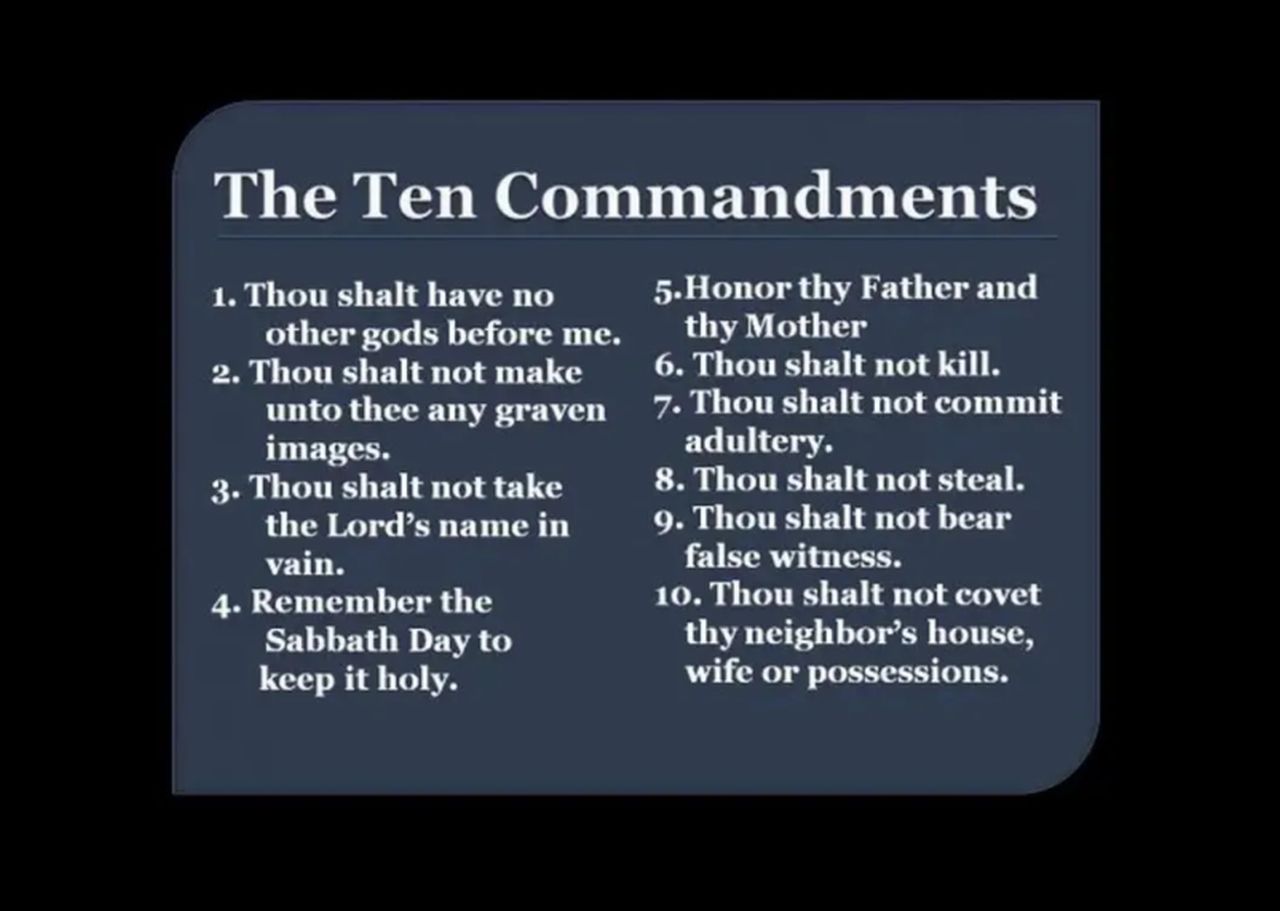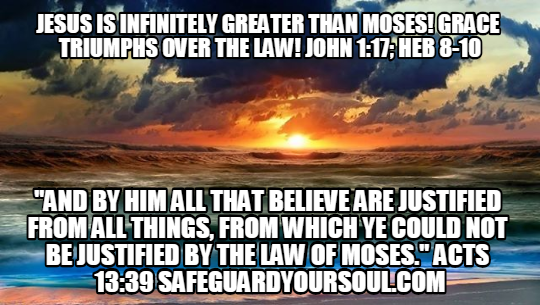Evidence that the Ten Commandments have been Abolished for Righteousness
author unknown
When referring to the law of commandments, the verses below use the same word for “Abolished”. Sabbatarians (those who strictly observe Saturday as the Sabbath, such as Seventh Day Adventists and other judaizers) say the latter verse is referring to the ceremonial law.
Having abolished in his flesh the enmity, even the law of commandments contained in ordinances; for to make in himself of twain one new man, so making peace; Ephesians 2:15
The “commandments contained in ordinances” refers specifically to the Ten Commandments.
“Know ye not, brethren, (for I speak to them that know the law,) how that the law hath dominion over a man as long as he liveth? or the woman which hath an husband is bound by the law to her husband so long as he liveth; but if the husband be dead, she is loosed from the law of her husband. So then if, while her husband liveth, she be married to another man, she shall be called an adulteress: but if her husband be dead, she is free from that law; so that she is no adulteress, though she be married to another man. Wherefore, my brethren, ye also are become dead to the law by the body of Christ; that ye should be married to another, even to him who is raised from the dead, that we should bring forth fruit unto God. For when we were in the flesh, the motions of sins, which were by the law, did work in our members to bring forth fruit unto death. But now we are delivered from the law, that being dead wherein we were held; that we should serve in newness of spirit, and not in the oldness of the letter. What shall we say then? Is the law sin? God forbid. Nay, I had not known sin, but by the law: for I had not known lust, except the law had said, Thou shalt not covet.” Romans 7:1-7
The following verses in Corinthians 3 clearly state that the Ten Commandments are abolished (four times) by using the same word for “Abolished” that was used in Ephesians 2:15.
“Do we begin again to commend ourselves? or need we, as some others, epistles of commendation to you, or letters of commendation from you? Ye are our epistle written in our hearts, known and read of all men: Forasmuch as ye are manifestly declared to be the epistle of Christ ministered by us, written not with ink, but with the Spirit of the living God; not in tables of stone, but in fleshy tables of the heart. And such trust have we through Christ to God-ward: Not that we are sufficient of ourselves to think any thing as of ourselves; but our sufficiency is of God; Who also hath made us able ministers of the new testament; not of the letter, but of the spirit: for the letter killeth, but the spirit giveth life. But if the ministration of death, written and engraven in stones, was glorious, so that the children of Israel could not stedfastly behold the face of Moses for the glory of his countenance; which glory was to be done away: How shall not the ministration of the spirit be rather glorious? For if the ministration of condemnation be glory, much more doth the ministration of righteousness exceed in glory. For even that which was made glorious had no glory in this respect, by reason of the glory that excelleth. For if that which is done away was glorious, much more that which remaineth is glorious. Seeing then that we have such hope, we use great plainness of speech: And not as Moses, which put a veil over his face, that the children of Israel could not stedfastly look to the end of that which is abolished: But their minds were blinded: for until this day remaineth the same vail untaken away in the reading of the old testament; which vail is done away in Christ. But even unto this day, when Moses is read, the vail is upon their heart. Nevertheless when it shall turn to the Lord, the vail shall be taken away. Now the Lord is that Spirit: and where the Spirit of the Lord is, there is liberty. But we all, with open face beholding as in a glass the glory of the Lord, are changed into the same image from glory to glory, even as by the Spirit of the Lord.” 2 Corinthians 3
Adventists and other torah/law keeping heretics say that the whole book of Galatians deals only with the ceremonial law, but a simple reading Galatians 4 proves them wrong;
“But when the fulness of the time was come, God sent forth his Son, made of a woman, made under the law, To redeem them that were under the law, that we might receive the adoption of sons. And because ye are sons, God hath sent forth the Spirit of his Son into your hearts, crying, Abba, Father. Wherefore thou art no more a servant, but a son; and if a son, then an heir of God through Christ. Howbeit then, when ye knew not God, ye did service unto them which by nature are no gods. But now, after that ye have known God, or rather are known of God, how turn ye again to the weak and beggarly elements, whereunto ye desire again to be in bondage? Ye observe days, and months, and times, and years. I am afraid of you, lest I have bestowed upon you labour in vain.” Galatians 4: 1-11
Colossians 2:14-16 clearly states that the weekly Sabbath is abolished. Adventists are at a loss as to know what to do with this verse!
Blotting out the handwriting of ordinances that was against us, which was contrary to us, and took it out of the way, nailing it to his cross; And having spoiled principalities and powers, he made a shew of them openly, triumphing over them in it. Let no man therefore judge you in meat, or in drink, or in respect of an holyday, or of the new moon, or of the sabbath days: Colossians 2:14-16
The idea that the Ten Commandments are separate from the ceremonial law, as Adventists claim, is a false doctrine not found in the Bible!
The Sabbatarians say that the Ten Commandments are for all mankind and are God’s universal eternal law. In response to this assertion, we reply:
If keeping the Sabbath was a moral law intended for all mankind, then why did God NEVER charge the Gentiles with breaking it. God charges the Gentiles many times for breaking all of the nine moral commandments on the tablets of stone, but NEVER ONCE says anything about breaking the Sabbath! This proves that Sabbath keeping is not inherently moral, but was just another ceremonial law given ONLY TO THE Jews!
The very words of the Ten Commandments clearly tell us that they were for the Jewish people ONLY! God never brought me or my ancestors out of Egypt! (Ex 20:2) The Lord has not given me the promised land of Canaan! (Ex 20:12) The Sabbath is a sign between God and fleshly Israel. There is no requirement for non-Jews to keep it! (Ex 31:1, 17; Ezek 20:12, 20) If Sabbath keeping was intended for all mankind, then why does Holy Scripture specifically state “strangers within your gates”? Obviously, the Gentiles (strangers) were never required at any point in history to keep the Sabbath!
Imagine that the Ten Commandments were a postal letter with no mailing address. The post office could easily determine who the intended recipient of the letter was by identifying the people being addressed.
• People who sometimes had strangers within their gates. (Ex 20:10)
• People who assembled at the mount on which there was a cloud. (Ex 19:16; Deut 5:22
• People who were slaves in Egypt. (Deut 5:15)
• People who had been delivered from Egyptian bondage. (Deut 5:15)
• People who were on their way to posses the land of Canaan. (Ex 20:12; Deut 5:16)
• People that God made a covenant with at Horeb. (Deut 5:1-3; Neh 9:14)
It would be impossible for people living in the Arctic Circle to keep the Sabbath. How could they, from sunset to sunset? Obviously God never intended anyone but the Jews living in Palestine to keep the Sabbath.
Historical archives prove the common view between 150AD and 200AD was that the Patriarchs never kept the Sabbath!
JUSTIN (150 AD): Moreover, all those righteous men already mentioned [after mentioning Adam. Abel, Enoch, Lot, Noah, Melchizedek, and Abraham], though they kept no Sabbaths, were pleasing to God; and after them Abraham with all his descendants until Moses… And you [fleshly Jews] were commanded to keep Sabbaths, that you might retain the memorial of God. For His word makes this announcement, saying, “That you may know that I am God who redeemed you.” (Dialogue With Trypho the Jew, 150-165 AD, Ante-Nicene Fathers, vol. 1, page 204)
TERTULLIAN (200 AD): Let him who contends that the Sabbath is still to be observed a balm of salvation, and circumcision on the eighth day because of threat of death, teach us that in earliest times righteous men kept Sabbath or practiced circumcision, and so were made friends of God. .. …Therefore, since God originated Adam uncircumcised, and inobservant of the Sabbath, consequently his offspring also, Abel, offering Him sacrifices, uncircumcised and inobservant of the Sabbath, was by Him commended… Noah also, uncircumcised – yes, and inobservant of the Sabbath – God freed from the deluge. For Enoch, too, most righteous man, uncircumcised and inobservant of the Sabbath, He translated from this world… Melchizedek also, “the priest of most high God,” uncircumcised and inobservant of the Sabbath, was chosen to the priesthood of God.
The Ten Commandments are the Old Covenant. (Ex 34:27-28)
The Old Covenant was abolished. (Heb 8:13)
The Ten Commandments are therefore abolished!
Points to consider regarding the Sabbath
1. If every man from Adam to Moses kept the Sabbath, why is the Hebrew word for the weekly Sabbath found in the Ten Commandments and never in the book of Genesis?
2. Why was it that, before Moses, no one was told to keep the Sabbath and why are there no examples of anyone keeping the Sabbath?
4. Why were the Patriarchs never instructed about he Sabbath, but were instructed as to offerings (Gen 4:3-4), altars (Gen 8:20), priests (Gen 14:18), tithes (Gen 14:20), circumcision (Gen 17:10), and marriage (Gen 2:24, 34:9)?
5. Why was there no weekly Sabbath commandment given in the New Testament?
6. Why was the Sabbath the only one of the Ten Commandments that are said to be “throughout your generations”, the usual phrase that indicates it was a temporary ceremonial law only for the Jews?
7. Why is there no example of Christians exclusively coming together on the Sabbath day as a church or prayer meeting after the resurrection of Christ?
8. Why is there no command in the New Testament for Christians to keep the Sabbath holy? Paul taught in the synagogues as many as 84 times. Why does the Bible never say he kept the Sabbath?
9. How could Adam, Noah and Abraham keep the Sabbath, when Deuteronomy 5:2-4 says that the Ten Commandment covenant was not made with any of the fathers of Israel who lived before Moses?
10. If we must follow the example of Jesus in all things like keeping the Sabbath, then why do Sabbatarians not follow the example of Jesus in circumcision, animal sacrifices and keeping Passover?
11. If the Sabbath was for Gentiles, then why was the Sabbath a sign to remind the Jews of their exodus from Egypt? (Ex 16:23, 29; 31:13-18)
13. If the Sabbath law is still in force, then why do they not stone their own members when they break the Sabbath as the law said?
14. Ellen G. White, who is considered inspired by Seventh-day Adventists, said that the Pope changed the Sabbath in about 321 AD. Why do all Adventists today reject their inspired prophet and say the change of the Sabbath occurred in about 140 AD?
15. If White was wrong about this, was she wrong when she traveled to heaven and saw the 4th commandment glowing brighter than all the rest?
16. If the current position of the Seventh-day Adventist church is that the change from Saturday to Sunday took place in 140 AD, doesn’t that mean that they have come a long way from White’s claim that this occurred in 325 AD?
17. If the change from Saturday to Sunday actually happened, why is there absolutely no discussion of this for the first 600 years of church history? Merely calling Sunday the Sabbath doesn’t count!
19. If Sabbatarians reject White’s assertion that Constantine changed the Sabbath day to Sunday, why do they keep bringing him up as proof? If Constantine changed the Sabbath to Sunday, why does here merely legislate that work must stop on Sunday with no actual mention of the day being moved?
20. If the first/old covenant was abolished according to Hebrews 8:13, and the Ten Commandment law was that first covenant (Ex 34:27-28; 1 Kings 8:9, 21; Heb 9:1-4), then why do Sabbatarians want to keep the first/old covenant?
21. Why is the universal record of history (75-500AD) 100% in unanimous agreement that Christians never kept the Sabbath (7th day) and have always worshipped on Sunday?
22. Why is the universal record of history (75-500AD) 100% in unanimous agreement that Christians ate the Lord’s Supper every Sunday in the tradition of Acts 20:7?
23. Why is the universal record of history (75-500AD) 100% in unanimous agreement that Christians always called Sunday the Lord’s Day because this was the day Jesus rose from the dead?
24. Why has no Sabbatarian every produced even one historical quote (75-500AD) that states Christians kept the Sabbath?
25. If the Sabbath is not a ceremonial law, then why is it lumped into the same identical class of “holy convocations” as the rest of the Jewish feast days? (Lev 23:2; Ex 20:9; 31:17)
26. If the Ten Commandments remain, but the book of law was abolished, then why did God put two copies of the 10 commandments in the book of the law? (Ex 20; Deut 5)
27. How can there possibly be a difference between “The Law of God” and the “Law of Moses”, when God gave the Law of Moses (Ezra 7:6; Neh 8:1) and Moses gave the Law of God (Neh 10:29; 2 Chron 34:14)?
28. If there is a distinction between the moral and ceremonial laws, why are the Jewish feast days called part of the Law of the Lord? (2 Chron 31:3)
29. If there is a distinction between the moral and ceremonial laws, then why in a single chapter of Nehemiah 8 are the following phrases all used interchangeably: “book of the law of Moses” v1, “the law” v2, “book of the law” v3, “the law of god” v8, “book of the law of god” v18?
30. Why are the two most important commandments contained within the Law of Moses unrelated to Sabbath keeping? (Mat 22:36-40)
31. What did Jesus say about the law that Moses gave the Jews? (John 7:19)
32. If, according to the Adventists, the Sabbath cannot change because God cannot change (Mal 3:6), then what about all the other feast days and laws that changed (Heb 7:12), and why did Jesus give a new commandment in John 13:34?
33. If the Ten Commandments are going to be in heaven, what is the use of “thou shalt not commit adultery”, if there is no marriage in heaven? (Luke 20:34-35)
34. If the Sabbath was given to all men, why then were Gentiles called “strangers”. Why were Gentiles outside the gates not required to keep the Sabbath? (Ex 20:10)
35. How could the Sabbath be a sign between God and Israel if all nations were expected to keep it? (Ex 31:17)
36. Why did God send the Jews into Babylonian Captivity for breaking the Sabbath, but never ever criticized any Gentiles for never keeping the Sabbath?
37. Why did God often criticize the Gentiles via the prophets for moral violations, but never for breaking the Sabbath?
38. If the Gentiles were supposed to keep the Sabbath, why are they called “strangers of the Covenant” in Ephesians 2:12?
39. If the term “commandments” always means the Ten Commandments, then why are the laws that are not part of the Ten Commandments called commandments in Matthew 19:16-19 not also included?
40. If the term “commandments” always means the Ten Commandments, then what did Paul call the injunction for prophet’s wives to keep silent in the assemblies, a “commandment of the Lord” in 1 Corinthians 14:37?
41. If the term “keep my commandments” always means the Ten Commandments, then why is there a new commandment? (John 15:10-12, John 13:34)
42. If only the Ten Commandments are going to endure until heaven and earth pass away, why did Jesus say the law AND THE PROPHETS? (Mat 5:17-18)
43. When Jesus was asked, “Teacher, which is the great commandment in the Law?” why did Jesus NOT QUOTE from the Ten Commandments, but from the abolished ceremonial law of Moses? (Mat 22:36-40)
44. If the Ten Commandments are the highest and most complete expression of God’s will, then why did they lack the two most important commandments? (Mat 22:36-40) and where is the prohibition against drunkenness, homosexuality and fornication?
45. If the Ten Commandments are the highest and most complete expression of God’s will, then why did Jesus give a new commandment to “love one another, even as I have loved you”? (John 13:34) Where were the Jews told to love their neighbor as God loved them?
46. If Christians worshipping on Sunday is equal to Sun Worship, then is Messianic/Adventists worshipping on Saturday equal to Saturn worship?
47. If Sabbatarians will boldly quote “scholars” who are really Bible trashers and skeptics who claim “the origin of Sunday worship is entirely pagan”, like Arthur Weigall in his ridiculous little book, “the paganism in our Christianity”, will these same Sabbatarians turn a few pages later where these same authors say the origin of the Sabbath is also pagan? “I have, already mentioned that Sunday, too, was a pagan holy-day; and in this chapter I propose to discuss the origin of this custom of keeping one day in the week as a Sabbath, or “day of rest,’ and’ to show that the practice was forcefully opposed by Jesus Christ. The origin of the seven-day week which was used by the Jews and certain other peoples, but not till, later by the Greeks or Romans, is to be sought in some primitive worship of the moon (The Paganism in Our Christianity, Arthur Weigall, 1928, p209, 210-211)
48. If the Sabbath is a moral law, why did Jesus say that David, the priests, and a man with his donkey could all break the Sabbath without sin? (Mat 12:1-14; Mark 2:23, Luke 13:10-17; 14:1-6 John 5:8-18; 7:19-24; 9:14-16)
49. If the Sabbath is a moral law, why did God grow tired of the Jews keeping it and told them to stop keeping the Sabbath? (Isa 1:13-14) Did God ever grow weary of anyone not committing adultery or murder, and tell them to be immoral and kill?
50. If the Sabbath is a moral law, how could Jesus break it without sinning? (John 5:18)
YES the whole 66 book canon of the Bible is for us and yet, IT reveals that a NEW covenant superseded the Old one. The book of Hebrews reveals to us that a “BETTER covenant” with “BETTER promises” made the old covenant obsolete “for righteousness.” (Hebrews 7:22; 8:6; Romans 10:4) The faith of the NEWWWW Testament saint, saved by grace, is not set upon trying to keep the law (“keeping Torah”) but rather set upon the only ONE to ever keep the law perfectly – then He. Christ, nailed it to the cross and “took it out of the way.” (Colossians 2:14-19) It’s over so repent and get over it, now! The infinitely inferior old was a mere shadow of the infinitely superior NEW Testament that was to come and HAS come with Christ! (Hebrews 10:1) Beware of the demonic judaizing devils in our midst. They are snakes!
Support | STORE | Podcasts | Jail/Prison Ministry | Mexico Mission here | All Ministry Updates | Fresh Start with God | “Fear hath Torment” – 100% Deliverance from all Fear! [podcast] | Resurrection Grace [podcast] | G.O.D. = Game Over Devil [podcast] | Justification | Grace and Good Works [podcast] | More on Assurance here | Eternal Security Debunked | The Cross Life | 100’s of Christ-centered, Scripture-rich podcasts for your edification in Christ.



-

 America4 months ago
America4 months agoThe Drugging of America: The Pharmakeia Sorcery Deception [podcast]
-

 Articles1 year ago
Articles1 year agoChildren being Rescued in Tunnels: Happening Now – UPDATE!
-

 Articles7 years ago
Articles7 years agoSelf-Examination in Preparation for the Lord’s Return
-

 Apostasy1 year ago
Apostasy1 year agoSHOCKING List of False Prophets Most Believe are True















































